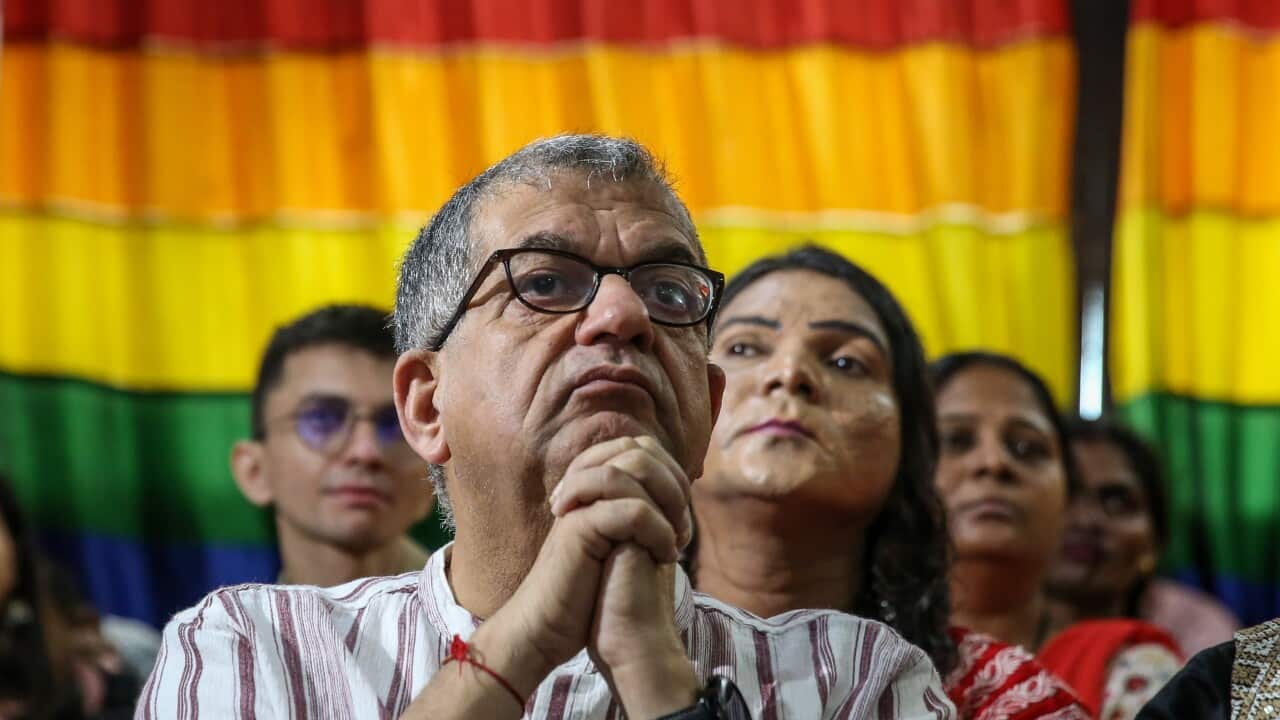Key Points
- India's Supreme Court on Tuesday declared that legalising same-sex marriage was a decision for parliament.
- The court ruling comes after a colonial-era ban on gay sex was scrapped in 2018.
- Queer members of the Indian diaspora in Australia remain hopeful the marriage laws will pass in the near future.
Sanjay watched from 10,500km away, at his home in southwest Sydney, as the Supreme Court in his native country of India declined to legalise same-sex marriage.
When handing down their verdict on Tuesday, the court’s five-judge bench said they had been divided on the matter, with two of the judges supporting same-sex civil unions. They ultimately concluded, however, that the decision to pass such a law falls within the domain of parliament.
"I held on hope that it would potentially come out in favour of same-sex marriage," Sanjay, 24, told SBS News. "But ultimately I've got to say I'm not really [surprised]."
While many felt that they saw it coming, it is a result that deals a significant blow to the advancement of gay rights in India, a nation that has taken major strides in recent years towards equality for LGBTIQ+ people.
In 2018 the Supreme Court overturned Section 377 of the Indian Penal Code, which criminalised gay sex, after unanimously ruling that it was unconstitutional. It further ruled that any discrimination on the basis of sexual orientation was also a violation of the Indian constitution. The Supreme Court on Tuesday similarly emphasised that queer relationships should not face discrimination by the state.
While dejected by the court's decision to not grant legal recognition to same-sex marriage, Sanjay and other members of the queer Indian diaspora in Australia remain optimistic that the verdict is more a speed bump than a barrier.
"There's no other way of putting it: it's just very disappointing," Sanjay said. "But I think it's not entirely disheartening, in that it is only five years since decriminalisation of gay sex."

Sanjay remains optimistic about the future of same-sex marriage in India. Source: Supplied
"In India, of course, it's going to take even more time," he added, noting the strong influence that religious leaders and groups have over the decisions being made in India's courts and parliament.
"We do have to remember Indian secularism is very different to Australian secularism, in that for us (in Australia), we keep state and religion very, very separate," he explained.
In India, he added, "The reality when it comes to politics and policymaking is that all the religions are consulted … So in terms of religious influence and politics, it's just a lot more pronounced there."
At least stating that without legal recognition, many same-sex couples could not exercise rights such as those linked to medical consent, pensions, adoption or even club memberships.
Now that the proposal to legalise same-sex marriage has failed to make it through the Supreme Court, members of the Indian LGBTIQ+ community are hopeful that it will be picked up by parliament or brought back before the legal system in a way that allows it to be reviewed again.
Alan, 64, said that although he wasn't surprised by the court's final decision to block same-sex marriage and uphold the status quo, he believes it's only a matter of time before the proposal passes, one way or another.
"While it's sad, we're optimistic that we will get something looked at in the near future," he told SBS News.
"Some of the conversations are around, 'If it's not marriage, is it same-sex unions being recognised?' So it's likely, but it'll take time. There's already people regrouping to take a different angle [to get] this back into the courts, to see how they can try to move this on further."

Alan migrated from India in 1977, at a time he says people didn't even talk about homosexuality. Source: Supplied
There was no literature, support groups, or information for members of the LGBTIQ+ community, he said. Since then, the nation has "changed dramatically".
"Since the removal of Section 377 to make homosexuality legal, at least, it's just kind of blossomed and flourished and there's groups and activists and a whole bunch of things happening," he said.
Activists have estimated India is home to an LGBTIQ+ community of approximately 135 million people. For many, the most detrimental impact of the court's decision to not legally recognise same-sex marriage, according to both Sanjay and Alan, will likely be the perpetuation of stigma among families, friends, and local communities.
"For the ordinary person, if you're looking at just the face value of this case, it's almost as though it's invalidating and putting the LGBT relationships on a second-class kind of level compared to heterosexual relationships," Sanjay said. "And this could definitely have a negative impact."
Alan echoed the suggestion, pointing out that recognition by the Supreme Court would have gone a long way towards convincing more conservative-minded people in India to acknowledge that homosexuality is "quote-unquote 'normal'".
For many in the LGBTIQ+ community, he added, the idea that same-sex couples should be legally allowed to marry is less about marriage itself than it is about recognition and equality.
"I would've been very surprised if marriage was on the forefront of every young Indian gay or queer person's mind," he said.
"I would say the percentage of people who are really keen to go and do it is small – I wouldn't have thought anything more than 15 to 20 per cent. But we're talking human rights here, so of course it doesn't really matter what the percentage is; it's about making sure people are equal."




